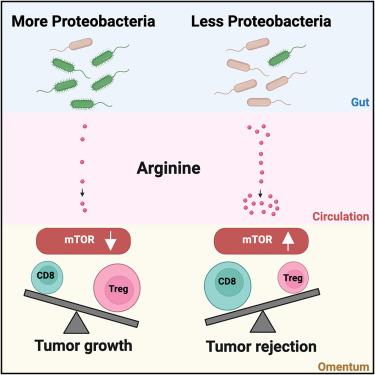Cell Host & Microbe ( IF 20.6 ) Pub Date : 2024-06-27 , DOI: 10.1016/j.chom.2024.06.003 Selene Meza-Perez 1 , Mingyong Liu 1 , Aaron Silva-Sanchez 1 , Casey D Morrow 2 , Peter G Eipers 2 , Elliot J Lefkowitz 3 , Travis Ptacek 3 , Christopher D Scharer 4 , Alexander F Rosenberg 5 , Dave D Hill 5 , Rebecca C Arend 6 , Michael J Gray 3 , Troy D Randall 1

|
Gut microbiota influence anti-tumor immunity, often by producing immune-modulating metabolites. However, microbes consume a variety of metabolites that may also impact host immune responses. We show that tumors grow unchecked in the omenta of microbe-replete mice due to immunosuppressive Tregs. By contrast, omental tumors in germ-free, neomycin-treated mice or mice colonized with altered Schaedler’s flora (ASF) are spontaneously eliminated by CD8+ T cells. These mice lack Proteobacteria capable of arginine catabolism, causing increases in serum arginine that activate the mammalian target of the rapamycin (mTOR) pathway in Tregs to reduce their suppressive capacity. Transfer of the Proteobacteria, Escherichia coli (E. coli), but not a mutant unable to catabolize arginine, to ASF mice reduces arginine levels, restores Treg suppression, and prevents tumor clearance. Supplementary arginine similarly decreases Treg suppressive capacity, increases CD8+ T cell effectiveness, and reduces tumor burden. Thus, microbial consumption of arginine alters anti-tumor immunity, offering potential therapeutic strategies for tumors in visceral adipose tissue.
中文翻译:

变形菌通过消耗精氨酸损害大网膜的抗肿瘤免疫力
肠道微生物群通常通过产生免疫调节代谢物来影响抗肿瘤免疫力。然而,微生物消耗的各种代谢物也可能影响宿主的免疫反应。我们发现,由于免疫抑制 Tregs,肿瘤在充满微生物的小鼠的网膜中不受控制地生长。相比之下,无菌、新霉素处理的小鼠或被改变的谢德勒菌群 (ASF) 定植的小鼠的网膜肿瘤会被 CD8 + T 细胞自发消除。这些小鼠缺乏能够进行精氨酸分解代谢的变形菌,导致血清精氨酸增加,从而激活 Tregs 中雷帕霉素 (mTOR) 通路的哺乳动物靶标,从而降低其抑制能力。将变形菌、大肠杆菌( E. coli )(而非不能分解代谢精氨酸的突变体)转移到 ASF 小鼠体内,可降低精氨酸水平,恢复 Treg 抑制,并阻止肿瘤清除。补充精氨酸同样会降低 Treg 抑制能力,增加 CD8 + T 细胞的有效性,并减轻肿瘤负担。因此,微生物对精氨酸的消耗改变了抗肿瘤免疫力,为内脏脂肪组织中的肿瘤提供了潜在的治疗策略。































 京公网安备 11010802027423号
京公网安备 11010802027423号